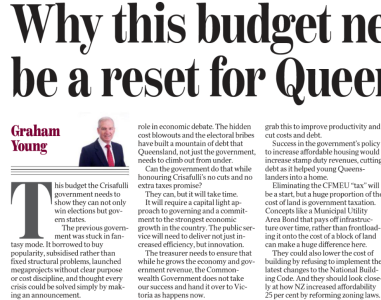 This budget the Crisafulli government needs to show they can not only win elections but govern states.
This budget the Crisafulli government needs to show they can not only win elections but govern states.
The previous government was stuck in fantasy mode. It borrowed to buy popularity, subsidised rather than fixed structural problems, launched megaprojects without clear purpose or cost discipline, and thought every crisis could be solved simply by making an announcement.
A realist government confronts trade-offs, governs for the long term, acts like a trustee, and prepares for risk and uncertainty. Does that describe the Crisafulli government? Tuesday night will reveal.
Tomorrow’s budget must mark a fiscal reset – not just in numbers, but in mindset. Queensland can no longer afford government by chequebook and press conference.
Former Treasurer Cameron Dick is the $45 billion man, because that is how much his budget blew out in just 12 months, making last year’s election the most deceptive and expensive on record.
That is a record of infamy that should disqualify him from any future role in economic debate.
The hidden cost blowouts and the electoral bribes have built a mountain of debt that Queensland, not just the Crisafulli government, needs to climb out from under.
Can the government do that while honouring Crisafulli’s no cuts and no extra taxes promise?
They can, but it will take time.
It will require a capital light approach to governing and a commitment to the strongest economic growth in the country. The public service will need to deliver not just increased efficiency, but innovation.
The treasurer needs to ensure that while he grows the economy and government revenue, the Commonwealth Government does not take our success and hand it over to Victoria as happens now.
And the budget must address our population bomb. We need an immigration pause so infrastructure can catch up with population. All of us, born here or not, deserve an Australian standard of living, not a “substandard” of living.
These aims can be achieved through an array of innovative policies. Here are just a few suggestions.
A more efficient, proactive public service is a must. The highest paid public servants with the highest productivity in the nation would be a badge of honour.
Fortunately, we are at an inflection point where AI is turbocharging organisational efficiency, and the state can grab this to improve productivity and cut costs and debt.
Success in the government’s policy to increase affordable housing would increase stamp duty revenues cutting debt as it helped young Queenslanders into a home.
Eliminating the CFMEU “tax” will be a start, but a huge proportion of the cost of land is government taxation. Concepts like a Municipal Utility Area Bond that pays off infrastructure over time, rather than frontloading it onto the cost of a block of land can make a huge difference here.
They could also lower the cost of building by refusing to implement the latest changes to the National Building Code. And they should look closely at how NZ has increased affordability 25% by reforming zoning laws.
Government also owns land which could be developed and put on the market at a price that would lower overall housing prices while paying-down state debt.
To build revenue we need cheap electricity to entice business to expand. They need to adopt the mantra “Storage first, renewables later” otherwise it won’t be reliable enough for advanced manufacturing.
They should also analyse the cost of some proposed electricity projects. Borumba Pumped Hydro has a capital cost 11 times higher per MW of electricity stored than Snowy 2.0. Does that make sense?
Announcing nine new gas exploration areas was a good start, but they need to expand the mining industry much faster without the Commonwealth taking the royalties, as it has with WA. There are tips from the 60s on how to do that when legendary public servants like Sir Leo Hielscher and Sir Syd Schubert when Queensland was skint after the last stint of Labor governments.
One lazy asset the government has is the public housing portfolio, which is in the books at $17 billion, but probably has a market value closer to $34 billion. There are better ways of ensuring the 56,000 in public housing have somewhere to live than owning all the properties. Joint ventures with not-for-profits will free-up government capital and pay down debt.
A government’s first budget sets the scene for the next election. This budget will tell us whether we’re back to reality from fantasy, and whether Queensland can become the leading state again.
And what the odds are on the Crisafulli government being still here for the Olympics.